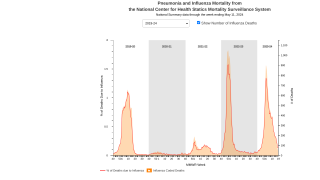FDA Accepts Supplemental Application for Xofluza Flu Medicine

The pharmaceutical company Roche announced that the United States (U.S.) Food and Drug Administration (FDA) has accepted a supplemental New Drug Application (sNDA) for Xofluza™ (baloxavir marboxil), as a single-dose, oral treatment for people at high risk of complications from the flu.
The FDA is expected to make a decision on approval by 4 November 2019.
Xofluza was initially approved by the FDA during October 2018 for people 12 years of age or older.
The Centers for Disease Control and Prevention (CDC) defines people at high risk for serious flu complications to include the following:
- adults 65 years of age or older, or
- those who have conditions such as asthma, chronic lung disease, morbid obesity or heart disease.
Sandra Horning, M.D., chief medical officer and head of Global Product Development at Roche, said in a press release, “Xofluza is the first antiviral medicine to demonstrate a significant and clinically meaningful benefit in people at high risk of complications from the flu."
The Roche sNDA is based on results from the phase III CAPSTONE-2 study of a single dose of Xofluza compared with placebo or oseltamivir 75 mg, twice daily for five days, in people 12 years of age or older and who are at high risk of complications from the flu.
CAPSTONE-2 is a phase III multicentre, randomized, double-blind study that evaluated the efficacy and safety of a single dose of Xofluza compared with placebo and oseltamivir in 2,184 people 12 years of age or older who are at high risk of complications from the flu.
The study, which was first presented in October 2018, found that Xofluza:
- Significantly reduced the time to improvement of influenza symptoms versus placebo in people at high risk of complications from influenza (median time 73.2 hours versus 102.3 hours; p<0.0001);
- Demonstrated superior efficacy (reduced time to improvement of influenza symptoms) versus placebo and oseltamivir in influenza type B (median time of 74.6 hours versus 100.6 hours and 101.6 hours, respectively (p=0.0138, p=0.0251);
- Demonstrated efficacy for secondary endpoints compared to placebo. Significantly reduced the time to resolution of fever (median time of 30.8 hours versus 50.7 hours; p<0.0001), the incidence of influenza-related complications (2.8% versus 10.4%; p<0.05), the use of systemic antibiotics (3.4% versus 7.5%; p=0.01) and the length of time the virus continued to be released from the body (viral shedding; median time of 48 hours versus 96 hours; p<0.0001).
- Similar efficacy results were seen between Xofluza and oseltamivir for several secondary endpoints, but a significant difference was observed in the time to cessation of viral shedding favoring Xofluza.
In CAPSTONE-2, Xofluza was well tolerated, with no safety signals identified. Xofluza had a numerically lower overall incidence of reported adverse events (25.1%) compared with placebo (29.7%) or oseltamivir (28.0%).
The most common adverse events reported in the Xofluza group were bronchitis (2.9%), diarrhea (2.7%), nausea (2.7%) and sinusitis (1.9%).
Xofluza will be further studied in a phase III development program including pediatric populations, post-exposure prophylaxis and severely ill hospitalized people with influenza, as well as to assess the potential to reduce transmission in otherwise healthy people.
Globally, annual influenza epidemics result in 3 to 5 million cases of severe disease, millions of hospitalizations and up to 650,000 deaths worldwide, says the CDC.
Roche is a global pioneer in pharmaceuticals and diagnostics focused on advancing science to improve people’s lives. The CAPSTONE-2 study was conducted globally by Shionogi & Co., Ltd.
Our Trust Standards: Medical Advisory Committee
- FDA accepts Roche’s supplemental new drug application for Xofluza for the treatment of influenza in people at high risk
- A Study of S-033188 (Baloxavir Marboxil) Compared With Placebo or Oseltamivir in Otherwise Healthy Patients With Influenza
- Flu Medicine Xofluza Risk & Benefits Explained by FDA
- Quickly Treating Influenza With Antivirals Reduced Mortality by 31%
- Study of S-033188 (Baloxavir Marboxil) Compared With Placebo or Oseltamivir in Patients With Influenza at High Risk

























